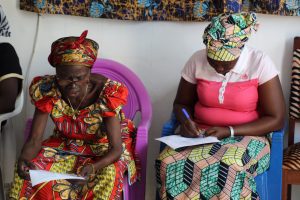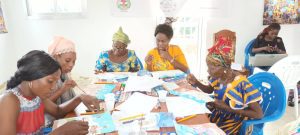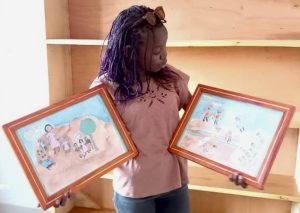February 14, 2023
Creating Collective Memory Through Art
When it comes to wars and conflicts, we often memorialize the soldiers lost or the innocent civilians killed in the crossfire. One group often left out from the official narrative is survivors of conflict-related sexual violence (CRSV). The absence of wartime sexual violence survivors from public discussion not only isolates them but denies them the ability to seek recognition, justice, and reparations. This belief is at the core of the collective memory initiative, “Breaking the Silence: challenging harmful beliefs, myths and indifference about sexual violence in conflict.”
This project seeks to encourage survivors to memorialise their experiences on their terms through the medium of art, contributing towards a ‘collective memory’. Collective memory can be defined as the process of group reflection that centres on remembering the past and the telling of stories in a creative way to teach future generations and dispel any damaging myths and beliefs. This can occur in the form of movies and documentaries about the lives of survivors, artwork, books, poetry, theatre, and the commemoration of important days/dates. Collective memory may contribute towards healing, recognition, prevention, advocacy, justice, reparations, and increased awareness of the consequences of CRSV.

For members of the SEMA network, the global network of Victims and Survivors to End Wartime Sexual Violence, establishing a collective memory has been a key priority. From its establishment in 2017, SEMA made clear that public recognition of their plights was necessary for reclaiming acceptance from their families and communities. Their intent was to create a collective memory that connected their own experiences with a wider understanding of what constitutes conflict and raise awareness of the detrimental consequences faced by survivors. This appeal was one the Mukwege Foundation was happy to facilitate. With financial support from the Robert-Bosch-Stiftung, this project became a reality in February 2022.
The Breaking the Silence project functions on two levels. At the global level, SEMA members engaged in peer-to-peer online learning exchanges to share ideas concerning creative memorialisation and plan to curate an online directory by collecting existing works of collective memory. For example, in June 2022, as part of its ongoing support to the SEMA Network the Mukwege Foundation organized a global retreat for its members to reconnect, strengthen their network, share their experiences, and advocate against CRSV.
During this retreat, survivors had a jam session with Make Music Matter and Marie Daulne (a.k.a Zap Mama). Make Music Matter, a Canadian-based NGO and longstanding partner of the Mukwege Foundation, offers group music therapy for sexual violence survivors. Working with a trained psychologist and music producer, participants write and record songs about their experiences, some of which are later disseminated for advocacy purposes. Through this collaboration, SEMA members created the song, “Solidarity”. In addition, Rachel Corner, a documentary photographer, photographed SEMA members. These photos are due to make their appearance in the recently-published book, “Breaking the Silence: Turning Pain into Power”, which celebrates the 5th anniversary of the SEMA network. Cataloguing an online directory, producing music, and documenting photos of survivors are all ways of creating a “collective memory.”
Meanwhile, at the national level, MOSUCA, a survivor-led network based in the Central African Republic (CAR) will use creative methods to document their experiences to present to the public. In September 2022, the Mukwege Foundation partnered with Maison de la Memoire Centrafique to set up the first workshops between survivors and artists. The workshops allow them to collaborate and get creative in re-telling their experiences as survivors through various forms of art. The type of art ranges from slam poetry to dancing. These artworks will be displayed in exhibitions in the cities of Bangui, Bouar, and Bambari, CAR, later in 2023.

Ultimately, the hope is that through this project, the silence and misinformation surrounding CRSV will be broken and spark a deeper understanding of the consequences of wartime sexual violence. Survivors’ artwork will also serve as a powerful advocacy tool to better support survivors’ rights to justice and redress. As expressed by one MOSUCA member in their slam poetry piece, “Let’s unite our voices, let’s build a collective memory in order to save lives, together let’s say no to violence against women in times of conflict, no more… it is time for you to stop crying, to regain your rights to respect and honour, if you have suffered so much then why keep silent?”

Written by Vianna Unland
















